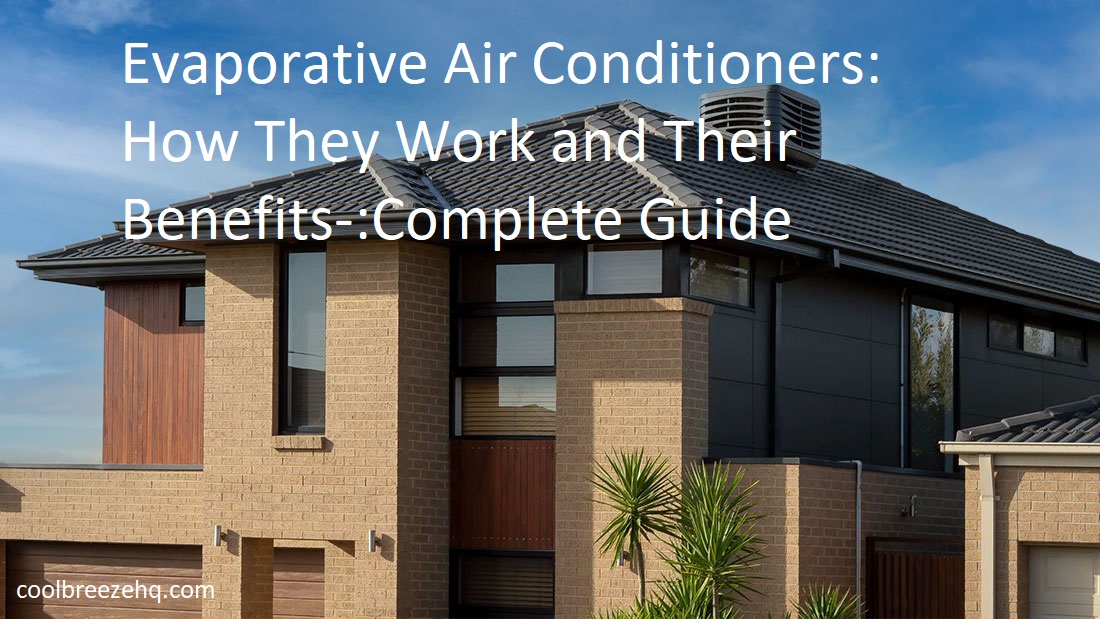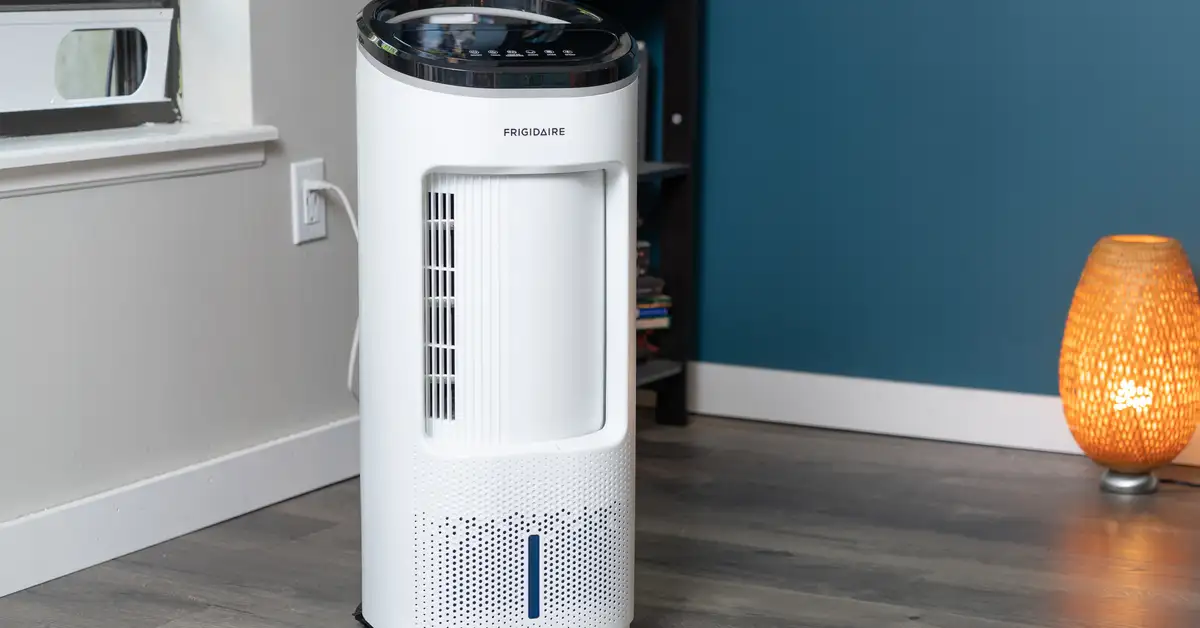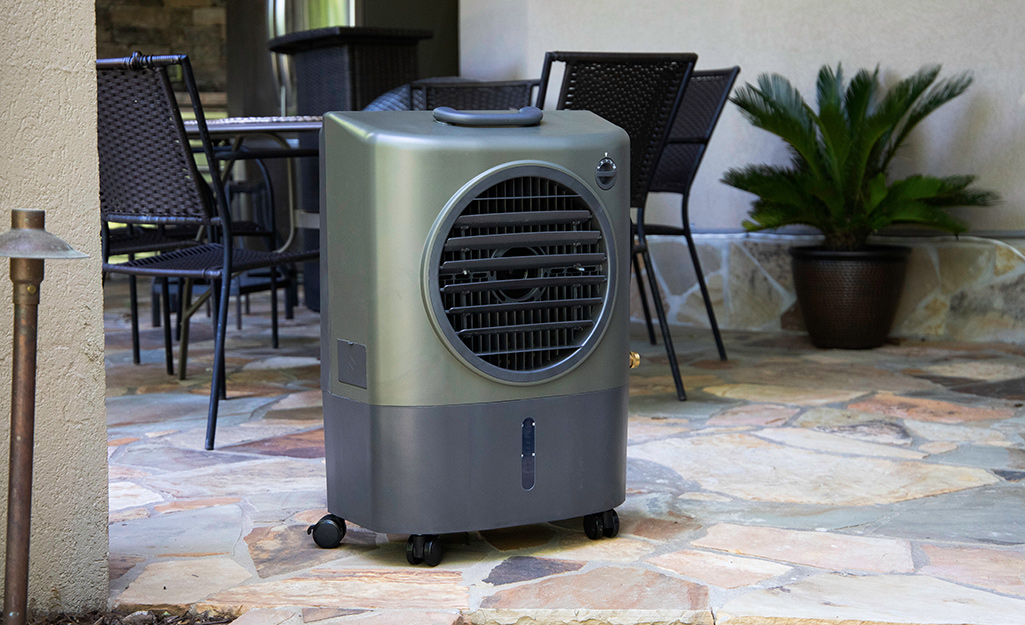Ready to beat the heat but don’t know where to start? You’re in luck! Here’s a complete guide on how evaporative air conditioners work and the various benefits they provide.
Stay cool, save money, and learn about all the great features of this energy-efficient cooling system!
Welcome to our comprehensive guide to evaporative air conditioners. There is much to cover, so let us begin.
Evaporative air conditioners (also called swamp coolers and wet air coolers) are an economic, energy-efficient form of cooling that work best in dry climates. These systems use an evaporation process with water and atmosphere to cool the temperature of a living space or workplace area. Evaporative ACs are typically installed outside on rooftops or walls and require minimal maintenance.
In this guide, we’ll discuss the benefits of choosing an evaporative air conditioner system over their more common cousins – conventional split-system air conditioners – as well as how this type of technology works, what rooms will benefit from them most, and other factors you should consider when deciding if this is the right choice for your home or business needs. We’ll also answer some common questions about installation timelines and costs associated with different units.
Explanation of what evaporative air conditioners are and how they work
Evaporative air conditioners, sometimes known as swamp coolers, are energy-efficient climate control systems that cool the air in indoor spaces by passing it over water-saturated pads that have been placed in frames. As the air passes over these pads, it draws heat from them, turning the water into vapor and cooling the air through a process of evaporation. This cooled air is then pushed out from the evaporative unit using powerful fans.
There are several types of evaporative units on the market that make use of a variety of technologies to provide powerful cooling and humidity management. Standalone units can be installed easily and typically require minimal maintenance – however some models may need to have their pad frames replaced periodically in order to ensure optimal performance. Centralized evaporative systems can also be hooked up to existing HVAC systems, further increasing its energy efficiency and providing efficient distribution of cooled air throughout an indoor space.
Unlike traditional air conditioners which use compressors to cool indoor spaces, evaporative units do not generate excess moisture or need refrigerants to function. This makes them an ideal solution for dry climates where traditional AC solutions are impractical or present environmental hazards due to their emissions or high installation costs. By eliminating many components (such as condensers) and operating without electricity, evaporative cooling devices also tend to have a lower total cost of ownership than their traditional counterparts – resulting in significant savings over time.
Importance of understanding how evaporative air conditioners work
In order to make the most of evaporative air conditioners (also known as swamp coolers), it is important to have a basic understanding of how they work. This type of cooling system puts the emphasis on the importance of air flow, causing hot outside air to pass through water-soaked pads. The resulting evaporation process creates a cooler indoor environment and pumps cooler air into homes and businesses.
The water in evaporative ACs has to be replenished constantly during usage and this is done via automatic water fill systems, which should be connected to an external tap or cistern. The ‘Fill tray’ gathers this water from an external source and pumps it into the reservoirs located within the cooling unit. As a fail-safe system, these units are typically encoded with adjustable high-level float switches that stop operations when predetermined levels are reached, in order to protect against overflowing basins or tanks.
Colder climates tend not to benefit from this type of cooling system but areas with higher humidity can really benefit from evaporative ACs as warm damp conditions can help improve their effectiveness 100% as compared with a traditional cooling system. Therefore, all consumers should understand how evaporative coolers work so they can assess whether they have environment that would make their investment in one worthwhile.
Benefits of Using Evaporative Air Conditioners
Evaporative air conditioning units are a highly efficient and cost-effective way to cool large indoor spaces. They offer several advantages for commercial and residential applications, including:
-Reduced energy consumption: Evaporative air conditioning consumes up to 75% less energy compared to traditional HVAC systems. This can result in significant monthly savings on your energy bills. Additionally, these systems tend to operate more quietly than traditional ACs, resulting in less noise pollution.
-Cost efficiency: Evaporative cooling systems require minimal upkeep costs and their parts are easy to find and inexpensive to replace. Additionally, evaporative air conditioners can last for many years with proper care, making them an excellent long-term investment.
-Air Quality Improvement: Evaporative air conditioners filter the air of impurities as it’s being cooled down. This makes them particularly advantageous for health-sensitive areas since they help clear airborne particles like dust, pet dander, and other allergens out of the atmosphere.
-Environmental Benefits: As mentioned previously, because evaporative cooling systems consume less energy than traditional HVAC units, they produce fewer emissions that are harmful for the environment. Moreover, evaporative unit components are recyclable making them an eco-friendly option when used responsibly.
Reduced energy consumption
Evaporative air conditioners use considerably less energy than conventional, refrigerant-based systems to cool your home or business. This is because they draw upon the naturally cooling properties of water rather than using electricity to power compressors and fans.
The water is added to the air in the unit which causes it to cool more quickly as it passes through. This results in cooler air that requires less energy to maintain and operate, saving you money on monthly utility bills.
Furthermore, since they do not rely on electrical components and do not use chemical refrigerants, they are also better for the environment.
Improved air quality
Evaporative air conditioners have the potential to improve air quality by eliminating airborne particles, such as dust, pollen, smoke and pet dander. This is made possible by the cooling process of exposing warm, muggy air to cool pads that contain water. The resulting evaporation of the water releases a mist of micron-sized droplets in the air which bind with airborne pollutants and pull them down to the floor where they cannot be inhaled. These pollutants can then be vacuumed up or mopped away from floors and carpets.
The addition of moisture to the air during this process has an added benefit of increasing indoor comfort, making it easier to breathe and feel refreshed in hot and stuffy spaces. Evaporative coolers also provide slight dehumidification while cooling which helps further increase indoor comfort levels. A variety of filters can enhance this effect helping clean the air even further, removing microscopic irritants such as mould spores, lint and bacteria that can cause allergies and other health problems.
Eco-friendliness
Evaporative air conditioners are becoming a popular choice for consumers due to their energy efficiency and low environmental footprint. They do not require chemical refrigerants in order to cool a room, and the cooling technologies used rely primarily on natural resources. The transfer of heat from a hot, dry area to a cooler, more humid environment is achieved through the evaporation of water molecules, which is why evaporative air conditioning systems are sometimes referred to as ‘swamp coolers’.
Additionally, evaporative air conditioners use outdoors fresh air as the source of coolness instead of recirculating the existing cooled room air. This ensures that only fresh and clean natural air is supplied into the indoor space while exhaust fumes are released outside. As such, they contribute significantly less to indoor pollution levels and global warming than traditional refrigeration models do.
Furthermore, many evaporative air conditioners use variable speed motors, allowing them to alter fan power output depending on the needs of a room or home. This avoids unnecessary power expenditure and supports the effort of conserving energy and reducing electricity costs in comparison with other types of cooling systems.
Health benefits
Evaporative air conditioners provide numerous health benefits. These benefits come from the way the air conditioner uses only cold water to cool down a room rather than relying on artificial refrigerants that can cause a variety of harmful and potentially dangerous effects. Because of this, they are becoming increasingly popular in residential and commercial settings.
The moist air circulated by evaporative air conditioners is beneficial to both lung and skin health. The additional humidity helps reduce the amount of dryness and irritation caused by traditional air conditioning systems. The oxygen content is also higher in this type of cooler due to the evaporation process, providing you with fresher air that may even help reduce fatigue and headaches.
Furthermore, because evaporative coolers don’t use any chemicals or gases to cool the area, they are more eco-friendly than traditional refrigerant based systems which can put out large amounts of ozone-harming emissions into the atmosphere. Evaporative cooling also provides a natural way to maintain good ventilation in an indoor environment as it pulls outside air into a room while circulating cooler indoor air out, allowing for more consistent temperatures throughout. Additionally, since this type of cooling system does not require expensive duct work or filters to maintain cleanliness, operating costs over time are reduced compared to other AC systems which require regular filter replacements for optimal performance.
Factors to Consider When Choosing Evaporative Air Conditioners
When it comes to cooling a space, an evaporative air conditioner may be the right choice for you. However, there are several factors to consider when deciding which evaporative air conditioning system is best for your needs. Before investing in a new unit, you should consider:
– System size: It’s important to choose an evaporative air conditioner that is the right size for your space. Too small of a unit won’t provide adequate cooling; conversely, too large of a system will consume too much energy and cost more in operating expenses.
– Placement: Where your evaporative air conditioner is located will also affect its performance and efficiency. Consider the layout of your home or commercial space and what areas need cooling the most when choosing where to install your unit.
– Power supply options: Evaporative air conditioners come with multiple power supply options, so it’s important to determine which one is best suited for your needs. Factors such as outlets available in the locale of installation and how power is supplied should be taken into consideration when selecting a power source option for your A/C system.
– Installation costs: The cost of installing an evaporative air conditioner should be taken into account before you purchase one. Be mindful of labor fees that may be incurred when installing or servicing the unit, especially if hiring professionals to complete this process.
Ultimately, selecting the most suitable evaporative air conditioning system will ensure optimal performance and energy efficiency within your home or commercial business environment. Asking questions and doing research on each product available can help guide you toward making an educated decision on which A/C system will best meet all of your requirements
Size of the unit
When selecting an evaporative air conditioning system, size is an important factor to keep in mind. The larger the unit, the more cooling power it will provide. To determine the best evaporative cooler for your home or business, you should consider how large the space is that you need to cool. An Evaporative Air Conditioner Calculator can help you calculate the exact size unit that fits your needs. Additionally, you should consider other factors like air quality and noise level when selecting your unit.
You should also be aware that some units can be used for both residential and commercial applications and are made to provide different levels of cooling capacity. Depending on your specific requirements, there are several sizes of evaporative air conditioners available on the market today ranging from small portables perfect for homes or offices to large industrial-sized units designed for large warehouse spaces or other commercial buildings needing powerful cooling solutions.
Climate conditions
The climate of an area has a significant impact on the efficiency of an evaporative air conditioner. Evaporative cooling works by replacing hot and humid air from inside a building with cool and dry external air. This cool, ventilated air is achieved by drawing fresh air through cooling pads that are saturated with water. The evaporative process draws heat out of the dry pad and outside air as it passes through.
It is important to understand the climate conditions of your region before determining whether an evaporative air conditioner is appropriate for your home or business. Different areas of the world will experience varying temperature, relative humidity, and atmospheric pressure based on their geographical location. All these factors have a direct impact on how efficiently an evaporative cooler can work in that region.
Generally, high relative humidity reduces effectiveness as higher levels of moisture make it harder for the water to draw heat away from the air passing through the cooling pads. In addition, when temperatures are very high or very low, then evaporation does not occur at optimum rates, making it difficult for effective evaporative cooling. It is also important to note that arid climates tend to be ideal conditions for this type of cooling system as there are typically lower levels of relative humidity present and greater differences between temperature indoors versus outdoors compared with more temperate climates where climatic variations may be more subtle in comparison.
Price and brand
Price and brand are important considerations when purchasing any type of evaporative air conditioner. Generally, fancier brands and models offer more features such as remote controls, multiple fan speeds, whisper-quiet operation and energy efficiency ratings. Higher quality products will have a solid construction and include warranties on parts or labor.
One of the advantages of evaporative coolers is that they come in a wide range of price points. For example, portable units can range from $100 to $300 while whole house systems can cost between $1,000-$3,000 depending on size and features. If you are considering a new system rather than replacing an existing one, then higher end equipment may be worth the extra cost due to improved performance. Your installation professional should be able to recommend an appropriate cooling solution for your needs within your budget parameters.
Conclusion
Evaporative air conditioners are an affordable and efficient alternative to traditional centralized cooling systems. They provide a reliable and cost-effective way to cool a home by using ambient air. Unlike other cooling solutions, evaporative air conditioners do not require refrigerants and are energy efficient, making them an attractive option for people looking for a cost-effective and environment-friendly way to cool their home.
Furthermore, evaporative air conditioning units come with the added benefits of being easy to install, gentle on the environment and requiring minimal maintenance to keep running smoothly. Evaporative air conditioners are designed with both durability and efficiency in mind; they also come with a variety of filters and emergency safety shutdowns that help prevent health issues from airborne pollutants or temperatures going beyond comfortable levels.
In conclusion, evaporative air conditioning is an effective way to provide comfort at home while still achieving savings on your monthly heating bill. Ultimately, the decision between an evaporative air conditioner vs conventional AC will depend on the particular situation you’re in; with more research you can weigh up your options accordingly.
FAQ
How does an evaporative air conditioner work?
An evaporative air conditioner works by using water to cool the air, which is then distributed throughout a space using a fan. The water evaporates and absorbs heat, which cools the air and increases its humidity.
What are the benefits of evaporative cooling?
The benefits of evaporative cooling include lower energy consumption, lower operating costs, improved air quality, and more natural and environmentally friendly cooling.
What is evaporative cooling an example of benefit to life?
Evaporative cooling is an example of a benefit to life because it is a natural and energy-efficient way of cooling indoor and outdoor spaces, which can improve comfort and health for people and animals.
Is evaporative air conditioning effective?
Evaporative air conditioning can be effective in dry and hot climates, as it provides natural and energy-efficient cooling. However, it may not be as effective in humid climates.
Where is evaporative cooling the most effective?
Evaporative cooling is most effective in dry and hot climates, such as in desert areas, where the air is dry and humidity is low.
What are examples of evaporative cooling?
Examples of evaporative cooling include sweating, panting in animals, and using a wet towel or fan to cool off.
What are the advantages and disadvantages of evaporative cooling?
The advantages of evaporative cooling include energy efficiency, low operating costs, and improved air quality. The disadvantages include the need for dry air, high humidity levels, and the potential for mold growth.
What is the disadvantage of evaporative cooling?
The main disadvantage of evaporative cooling is that it requires dry air to work effectively, so it may not be as effective in humid climates.
What are two important functions of evaporative cooling on Earth?
Two important functions of evaporative cooling on Earth are regulating the planet’s temperature and maintaining the water cycle by evaporating water from the surface of the Earth.
What type of home would benefit using an evaporative cooler?
Homes located in dry and hot climates would benefit the most from using an evaporative cooler, as it provides natural and energy-efficient cooling.
See more-
- Best wall mounted air conditioner heater combo 2023
- Best 6000 btu air conditioner 2023
- Best ventless air conditioner 2023
- Best through the wall air conditioner 2023
- Best sliding window air conditioner 2023

